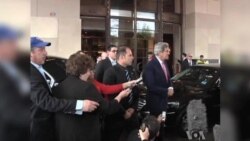GENEVA —
U.S. Secretary of State John Kerry is in Geneva, after negotiators there worked late into the night toward an agreement on curbing Iran's nuclear program and easing economic sanctions. The State Department says he is there "with the hope that an agreement will be reached."
Kerry flew overnight to join the talks. The State Department says he will try to “help narrow the differences and move closer to an agreement.” After arriving Saturday, the country's top diplomat began a series of meetings.
His Russian counterpart, Foreign Minister Sergei Lavrov, arrived in Geneva Friday and had a meeting with Iran's chief negotiator, Mohammad Javad Zarif.
The United States and Russia are two of the six countries designated by the United Nations Security Council to conduct these talks. Foreign ministers from the others - Britain, France, Germany and China - also may come to Geneva, as they did during the last round of negotiations two weeks ago.
The decision for Kerry to come was made late Friday, after what a spokesman called “intensive, detailed discussions” over three days.
Negotiators have described the talks as “very hard,” but a former British ambassador to Iran, Richard Dalton, said both sides have a stake in reaching an agreement, and failure this week would be a serious setback.
“It would be extremely unfortunate, because as we've seen between second and third rounds, both sides seem to have toughened up their position in some respects. So, if we see a failure now, it won't be any easier to find compromises,” said Dalton.
Dalton said the negotiators may have to try for a more limited first stage accord if their current effort fails.
Already, these talks are intended only to reach a preliminary agreement on confidence building steps. Then there would be a six-month negotiating period to reach a full accord and potentially end all nuclear-related economic sanctions, which have devastated Iran's economy.
No one is saying exactly what the gaps are, but issues center on Iran's extensive capability to enrich uranium to near weapons grade, and its demands for sanctions relief in return for freezing, and perhaps rolling back, parts of its nuclear operation. Iran says it does not want to build a nuclear bomb, but the Security Council wants proof, through the elimination of the highly enriched stockpile and verifiable restrictions for the future.
Iran wants recognition of what it sees as its right to enrich uranium. And it apparently wants more immediate sanctions relief than the U.N. team is willing to give.
Both sides are under pressure to move quickly.
In Iran, hardliners are eager to declare the failure of the relatively moderate government that was elected in June with a mandate to seek an end to the sanctions.
In the United States, a key member of the contact group and some members of Congress want to add sanctions to force Iran to make more concessions, a move the Obama administration says could kill any chance of a peaceful resolution to the dispute.
Kerry flew overnight to join the talks. The State Department says he will try to “help narrow the differences and move closer to an agreement.” After arriving Saturday, the country's top diplomat began a series of meetings.
His Russian counterpart, Foreign Minister Sergei Lavrov, arrived in Geneva Friday and had a meeting with Iran's chief negotiator, Mohammad Javad Zarif.
The United States and Russia are two of the six countries designated by the United Nations Security Council to conduct these talks. Foreign ministers from the others - Britain, France, Germany and China - also may come to Geneva, as they did during the last round of negotiations two weeks ago.
The decision for Kerry to come was made late Friday, after what a spokesman called “intensive, detailed discussions” over three days.
Negotiators have described the talks as “very hard,” but a former British ambassador to Iran, Richard Dalton, said both sides have a stake in reaching an agreement, and failure this week would be a serious setback.
“It would be extremely unfortunate, because as we've seen between second and third rounds, both sides seem to have toughened up their position in some respects. So, if we see a failure now, it won't be any easier to find compromises,” said Dalton.
Dalton said the negotiators may have to try for a more limited first stage accord if their current effort fails.
Already, these talks are intended only to reach a preliminary agreement on confidence building steps. Then there would be a six-month negotiating period to reach a full accord and potentially end all nuclear-related economic sanctions, which have devastated Iran's economy.
No one is saying exactly what the gaps are, but issues center on Iran's extensive capability to enrich uranium to near weapons grade, and its demands for sanctions relief in return for freezing, and perhaps rolling back, parts of its nuclear operation. Iran says it does not want to build a nuclear bomb, but the Security Council wants proof, through the elimination of the highly enriched stockpile and verifiable restrictions for the future.
Iran wants recognition of what it sees as its right to enrich uranium. And it apparently wants more immediate sanctions relief than the U.N. team is willing to give.
Both sides are under pressure to move quickly.
In Iran, hardliners are eager to declare the failure of the relatively moderate government that was elected in June with a mandate to seek an end to the sanctions.
In the United States, a key member of the contact group and some members of Congress want to add sanctions to force Iran to make more concessions, a move the Obama administration says could kill any chance of a peaceful resolution to the dispute.












